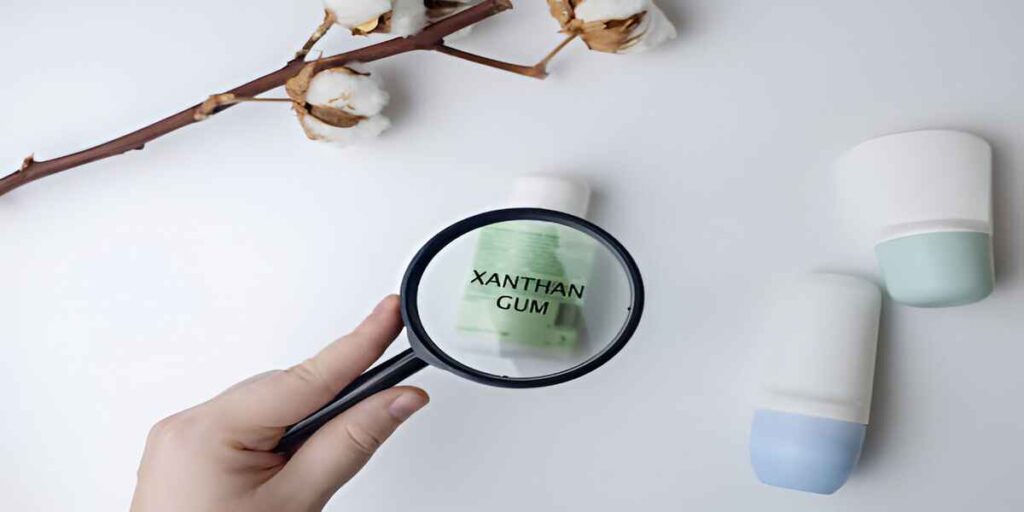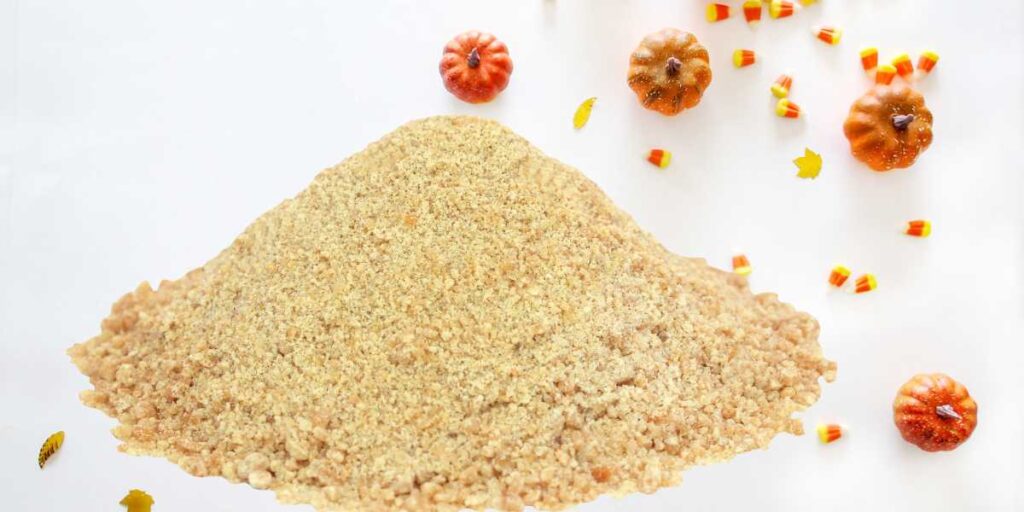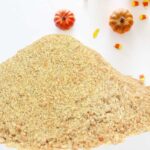Xanthan gum is a polysaccharide made by the bacterium Xanthomonas campestris through fermentation using glucose, sucrose, or lactose. It becomes a fine powder that acts as a thickening agent and stabilizer in food products like salad dressings, sauces, dairy products, bakery items, and gluten-free products. This valuable ingredient helps increase viscosity, improve texture, and achieve desired food manufacturing consistency.
Is xanthan gum Halal?
Yes, xanthan gum is usually considered halal. It is produced through the fermentation of sugar molecules. As long as no haram ingredients are involved, it remains halal. Manufacturers should ensure their product aligns with Islamic food principles during production and serving.

Muslim scholars often recommend analyzing the ingredients in detail to confirm halal status. Research comments and precautions help clarify this matter. Xanthan gum can be a halal gum if it does not violate these principles.
E415 code and Halal
Xanthan gum, a polysaccharide, ferments carbohydrates using the bacterium Xanthomonas campestris. The European Union has approved this additive and has the E number E415 to identify it. The numbering system helps to classify food additives.
- E415 indicates xanthan gum as a safe additive.
- Halal status depends on its production process.
What activities can Muslims use xanthan gum?
Xanthan gum is halal and fits General Islamic Dietary Guidelines. It is made by microbial fermentation of carbohydrates and has no ingredients prohibited in Islam. Muslims can consume and use it with confidence. Xanthan gum is a thickening agent and stabilizer in food and non-food applications.
- Safe for Muslims
- Improves texture and shelf life
- Used in foods and cosmetics
- Helps in food preservation
- Present in medications and industrial applications
Xanthan gum is ordinary in recipes like sauces, soups, and baked goods. It enhances the elasticity of doughs and batters. In food preservation, it stabilizes canned and jarred foods. In cosmetic products, it thickens creams, lotions, and toothpaste. Pharmaceutical products also use xanthan gum as a suspending agent, binder, and stabilizer.
Xanthan gum is not just limited to food or cosmetics. It plays a crucial role in industrial applications. It thickens paints, binds adhesives, and stabilizes drilling fluids. Its versatility makes it valuable across various sectors, and it remains halal and safe for Muslims to use daily.
Does the E415 code refer to halal xanthan gum?
The E415 code assigned to xanthan gum in the European Union identifies the food additive as halal if it is produced through the fermentation of carbohydrates by the bacterium Xanthomonas campestris under Islamic food law. Polysaccharide creation and E number specify that additives meet approved standards, preventing unfair practices.
- E415 designates xanthan gum as a halal additive.
- The fermentation method impacts halal status.
- Production must align with Islamic food law.
- Polysaccharide produced by Xanthomonas campestris.
The halal status of xanthan gum depends on production involving microbial fermentation. Islamic food law requires careful specification of the E number assigned to avoid unfair practices. E415 ensures compliance with these standards.
How do you know more details about xanthan gum?
Halal Dietary Supplements, Snacks, and Sweets containing xanthan gum require careful verification. Check product labels for halal certification and contact manufacturers if the information is missing. Inquire about their halal certification status, sourcing, and production processes.
Research whether the manufacturer has obtained halal certification from a reputable halal-certifying organization. Seek guidance from your local Muslim community or religious leaders for recommendations on Halal Dietary Supplements and Halal Snacks and Sweets containing xanthan gum.
Key Steps to Confirm Halal:
- Check labels for halal certification.
- Contact manufacturers directly.
- Consult halal-certifying organizations.
- Seek guidance from the Muslim community.
- Research Manufacturer Details:
- Research their halal certification status.
- Investigate their sourcing practices.
- Check the manufacturer’s website.
- Review other reliable sources.
Fatwa by Mawlana Ilyas Patel
Xanthan gum is a polysaccharide from corn, wheat, or other crops. It’s a plant-derived ingredient and is recognized as Halal. The gum is manufactured through fermentation, which uses isopropyl alcohol to precipitate it, which then evaporates. The gum is then dried, milled, and turned into a powder soluble in water or brine.
Even though non-wine alcohol might be used as a chemical tool to extract flavored flavors like vanilla extract, it does not remain in the final product. Scholars agree that xanthan gum is permissible and Halal, even with the E415 label.
"Xanthan gum, being plant-based and processed to remove any non-Halal elements, is deemed Halal."
Conclusion
Xanthan gum is a polysaccharide labeled as E415. It’s produced from sugar molecules in corn, wheat, and other crops and is manufactured using isopropyl alcohol that evaporates completely. The dried and milled gum is recognized as halal under Islamic food principles because no haram ingredients are mixed during production. Soluble in water and brine, it’s safe for serving in halal foods, with no non-wine alcohol involved in flavor extraction like vanilla extract.
Frequently Asked Question(s)
Is xanthan gum halal in Islam?
Xanthan gum is an additive used in many foods and is considered halal. The World Health Organization and Food and Agriculture Organization (WHO/FAO) have reviewed and endorsed its safety. It is often marketed as organic, vegetarian, and kosher.
Does Xanthan Gum Contain Alcohol?
Xanthan gum is a solid substance with concerns about alcohol. It’s made through fermented sugar, sometimes producing Ethanol or Isopropyl Alcohol. These are not added but occur naturally and are usually removed.
Is Xanthan Gum a Gelatin?
Xanthan gum stabilizes mixtures like gelatin but is vegan and not from animal sources. It’s an excellent alternative for those with food restrictions or allergies, and many people benefit from substituting it in recipes.
Is Stabilizer Xanthan Gum Halal?
Xanthan gum’s halal status relies on its certifications. DirectChems’ Xanthan gum is distinguished by its halal and kosher certifications. This guarantee ensures it meets halal guidelines.






